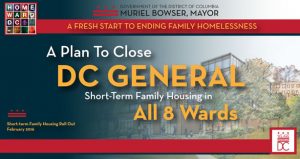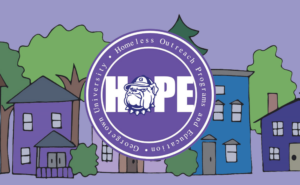Four years ago, in the face of the Jan. 6 insurrection, the D.C. government failed to protect the District’s unhoused population from the heightened threat of political violence. As a result, unhoused residents faced forcible displacement and the disruption of access to food and other resources, in addition to incidents of verbal and physical harassment. Now, given the high potential for political violence in a presidential race widely regarded as more divisive and critical than the last, D.C. officials cannot again fail to prioritize the protection of unhoused people in developing measures to protect all residents of D.C. from political violence.
A disproportionately high percentage of D.C.’s residents experience homelessness—a 2023 U.S. Department of Housing and Urban Development report found that D.C. has a higher rate of homelessness than any state in the country. While laws criminalizing homelessness in the name of public safety have increased dramatically nationwide, a citywide rise in encampment closures and stricter enforcement of anti-homeless policies in D.C. public libraries have especially worsened conditions for D.C.’s unhoused population in the year leading up to the presidential election. The city has also cut funding for eviction protection and rapid re-housing programs, putting low-income residents who depend on these programs at further risk of experiencing homelessness without mechanisms for support.
The Jan. 6 insurrection demonstrated the disproportionate impact of political violence on unhoused people. Unhoused people, who already face high risks of bodily harm, reportedly experienced harassment from the influx of far-right Trump supporters, including threats to burn encampment tents down. Many advocates feared that white supremacist Trump supporters would target, abuse, or otherwise harm unhoused people in D.C., about 80% of whom identify as Black or African American.
In light of this risk, the D.C. government attempted to provide some protection for unhoused folks, but these efforts failed, even when leaning on nonprofits to fill in the gaps. Ahead of the 2021 inauguration, the D.C. Department of Human Services (DHS) matched unhoused people with Airbnbs donated by a nonprofit partner. However, after it was revealed that many of the Jan. 6 insurrectionists found lodging in Airbnbs, the company canceled all reservations during inauguration week. As a result, unhoused people and outreach organizations were confronted with extremely limited housing options.
Airbnb’s decision to cancel all reservations made clear that the city cannot rely on private entities to protect unhoused people without backup plans. In preparing for this election, the city government and its federal partners must create multiple contingency plans in conversation with major outreach groups like Miriam’s Kitchen, Bread for the City, and Pathways to Housing D.C. to protect unhoused people amidst these kinds of disruptions. Potential solutions could include securing short-term rentals from multiple providers located outside of the city or guaranteeing hotel accommodations for people experiencing homelessness.
In January 2021, security measures designed to safeguard city residents and public officials, inadvertently undermined efforts by the city and homeless outreach groups to protect unhoused people. While DHS authorized outreach providers to pay their staff overtime in order to conduct additional outreach to unhoused people in D.C., amplified security measures—including the short-term closing of downtown streets and the erection of a 7-foot fence around the Capitol—severely limited providers’ ability to reach their clients. These safety regulations hindered not only meal delivery, vaccination clinics, and bathroom services, but also obstructed access to mental health support for unhoused individuals, many of whom feared harassment and threats from rioters.
To protect all of the District’s residents, government officials must work with homeless outreach organizations to ensure election security measures do not inhibit their operations. The D.C. government should assist outreach providers proactively, such as allowing them to work after curfew or receiving special permission to enter restricted areas.
D.C.’s lack of autonomy, combined with both Congressional overreach and neglect, also limits the city’s ability to quickly respond to its own residents’ needs, a recurring issue with real consequences for the health and safety of District residents. Notably, some security measures implemented by the National Guard and the Secret Service in January 2021 fell outside the scope of the D.C. government’s control. The U.S. Department of Homeland Security’s designation of the upcoming election certification as a National Special Security Event will result in even more stringent security measures in D.C. than the last presidential election cycle—and potentially even greater disruptions for D.C.’s unhoused population. D.C. and federal officials must collaborate to develop an election security plan that includes multiple flexible options for unhoused people, explicitly addressing how broader protective policies may impose challenges for them.
We urge D.C. officials to elevate and fulfill the needs of unhoused residents when planning for mitigating political violence around the election—however, it is also abundantly clear that in order to break the cycle of vulnerability, D.C. must address the homelessness crisis at its root. The longer people remain on the streets, the more difficult it becomes for them to secure permanent housing. The city must adopt housing-first solutions that emphasize the dignity and humanity of every person and affirm their right to housing, no matter their life circumstances. Historically, successful efforts to reduce homelessness rates have required investment in rental assistance and housing support programs that keep people from experiencing homelessness in the first place. In the long term, the government must also prioritize funding for programs like Permanent Supportive Housing that assist at-risk individuals in finding and maintaining affordable permanent housing.
When thinking about who the city should “protect,” the District must prioritize those who are most vulnerable to election-related violence. If D.C. truly aims to “ensure the safety and security” of residents and election participants, it must support foundational social security programs that address the homelessness crisis at its source, not its symptoms.
The editorial board is the official opinion of The Georgetown Voice. The board’s editorials reflect the majority opinion of the board’s members, who are listed on the masthead. The editorial board strives to provide an independent view on issues pertinent to Georgetown University and the broader D.C. community, based on a set of progressive institutional values including anti-racism, trauma-informed reporting, and empathetic and considerate journalism. The editorial board operates independently of the Voice’s newsroom and the General Board.






